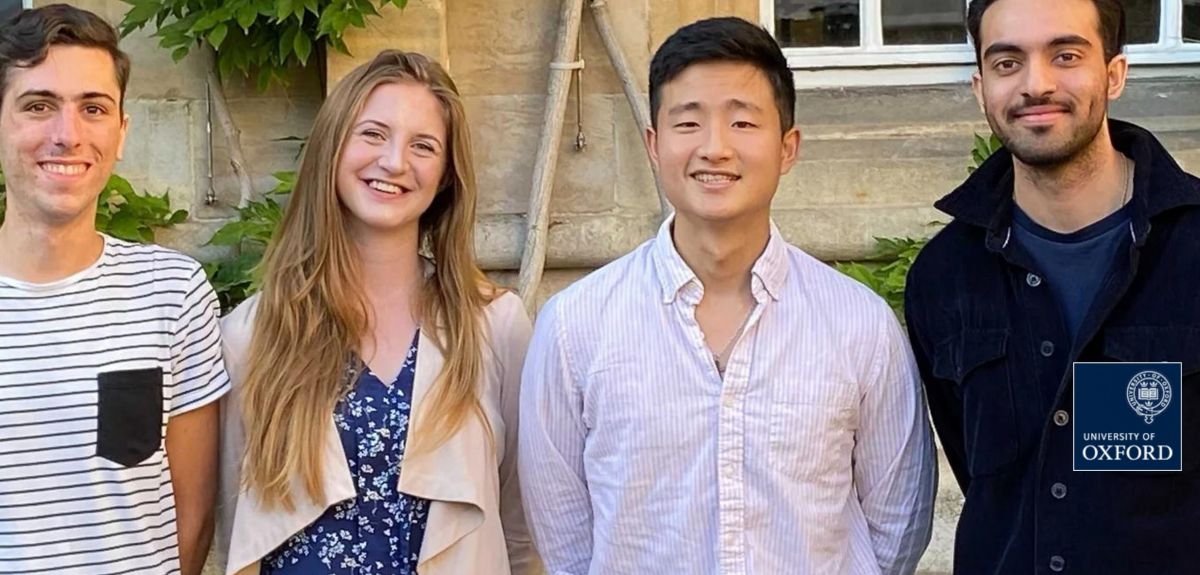
Student Spotlight: Oxford climate start-up wins $5m Elon Musk XPRIZE
Two Oxford students have won one of 23 Elon Musk XPRIZEs for their co-founded start-up, CyanoCapture. Samir Chitnavis, a Master of Biology at Jesus College and David Kim, a postgraduate in Medicine at Christ Church aim to provide affordable, long term carbon capture on an industrial scale. Read more about their aims to help industries to reach net zero.
The journey so far
CyanoCapture was founded in January 2021 and aims to provide affordable, long term carbon capture on an industrial scale by harnessing genetically modified cyanobacteria.
Already familiar securing backing and investment from the likes of Oxford's Biotech Society and Oxford Foundry’s All-Innovate Competition, David and Samir have now gone on to win $5m in the XPRIZE student competition. The $100m XPRIZE for Carbon Removal award programme is supported by Elon Musk and the Musk Foundation and was launched, in part, to fund early stage concepts from the next generation of carbon removal innovators. Winning student teams can use the funds to compete in subsequent rounds of XPRIZE Carbon Removal or to develop key supporting technologies which will enable carbon dioxide removal.
Tackling climate change
CyanoCapture believes it is on track to be the first company to bring the cost of carbon capture below the €50 per tonne mark. Its carbon capture technology will cost industries such as power stations and cement factories less to capture each tonne of CO2 than the cost which would otherwise be paid in emission tax. The company estimates that a 750m x 600m installation will be able to capture over 100,000 tonnes of CO2 each year, saving up to 5.2 million Euros in tax.
When asked what pushed them down this path, Samir said: “Climate change is a global priority. Our vision is to be a central player in the global roadmap towards achieving net zero by 2050. With a constantly falling cap on carbon emissions and an ever-rising cost of carbon credits and penalty fines, combined with political shifts in the EU and the US, carbon capture technologies are more economically viable than ever before. With the University’s launch of the Oxford GAV Conservation Studio accelerating novel technologies and innovative solutions to address the world’s most pressing environmental problems, we feel validated that this is the right time and the right place to innovate.”
Looking to the future
David said: “In my view, it is only when global markets are restructured to truly account for its negative externalities, that we will accelerate progress towards net zero. And this is exactly what we are beginning to see today as more countries legislate carbon tax and cap-and-trade systems. However, no one is providing a way to capture CO2 at the scale that is required. That is the gap we are addressing.”

Learn more about CyanoCapture.
 Student story: Finding space for Kosovo at Oxford
Student story: Finding space for Kosovo at Oxford
 Oxford students shortlisted as McCall MacBain Scholarship finalists
Oxford students shortlisted as McCall MacBain Scholarship finalists
 Student story: My time at Oxford has been deeply transformative
Student story: My time at Oxford has been deeply transformative
 Welfare blog: Dealing with imposter syndrome
Welfare blog: Dealing with imposter syndrome
 Student story: Rowing sabbatical officer
Student story: Rowing sabbatical officer